Abstract
OBJECTIVES--To assess the frequency and clinical associations of anti-chromo antibodies in connective tissue disease and to study their relationship to anti-centromere autoreactivity. METHODS--Anti-chromo and anti-centromere antibodies (ACA) were measured by immunoblotting in 50 patients with systemic sclerosis (SSc) and 58 connective tissue disease controls. Common epitopes on centromere and chromo antigens were sought using affinity-purified antibodies from immunoblots. RESULTS--Anti-chromo antibodies were detected in three of 32 sera with ACA and no controls. The three patients with anti-chromo antibodies had limited cutaneous SSc, and two had erosive arthritis. No cross-reactivity between chromo or centromere-related proteins was demonstrated. CONCLUSIONS--Anti-chromo antibodies form a rare autoantibody specificity that may identify an overlap group of patients with SSc and arthritis. Chromo and centromere antigens are associated but immunologically distinct autoimmune targets. Whether they localise to the same chromosomal site remains unknown.
Full text
PDF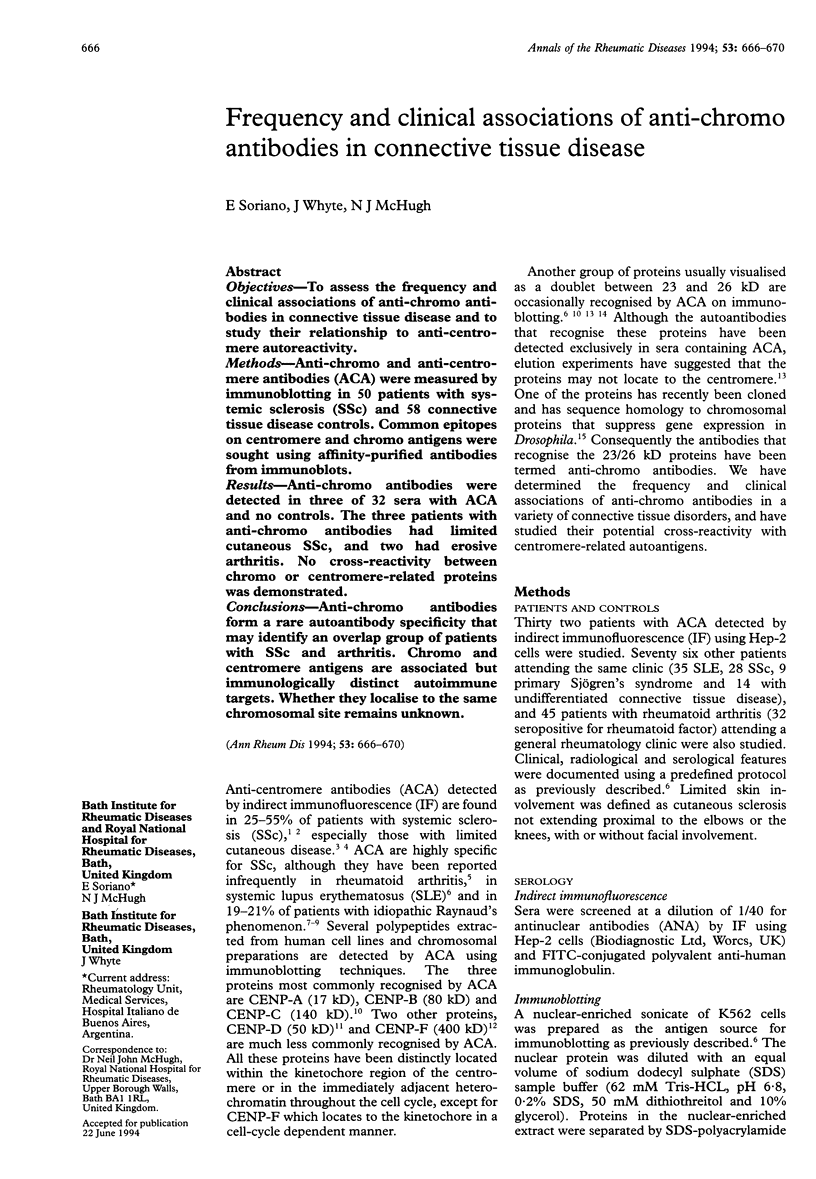
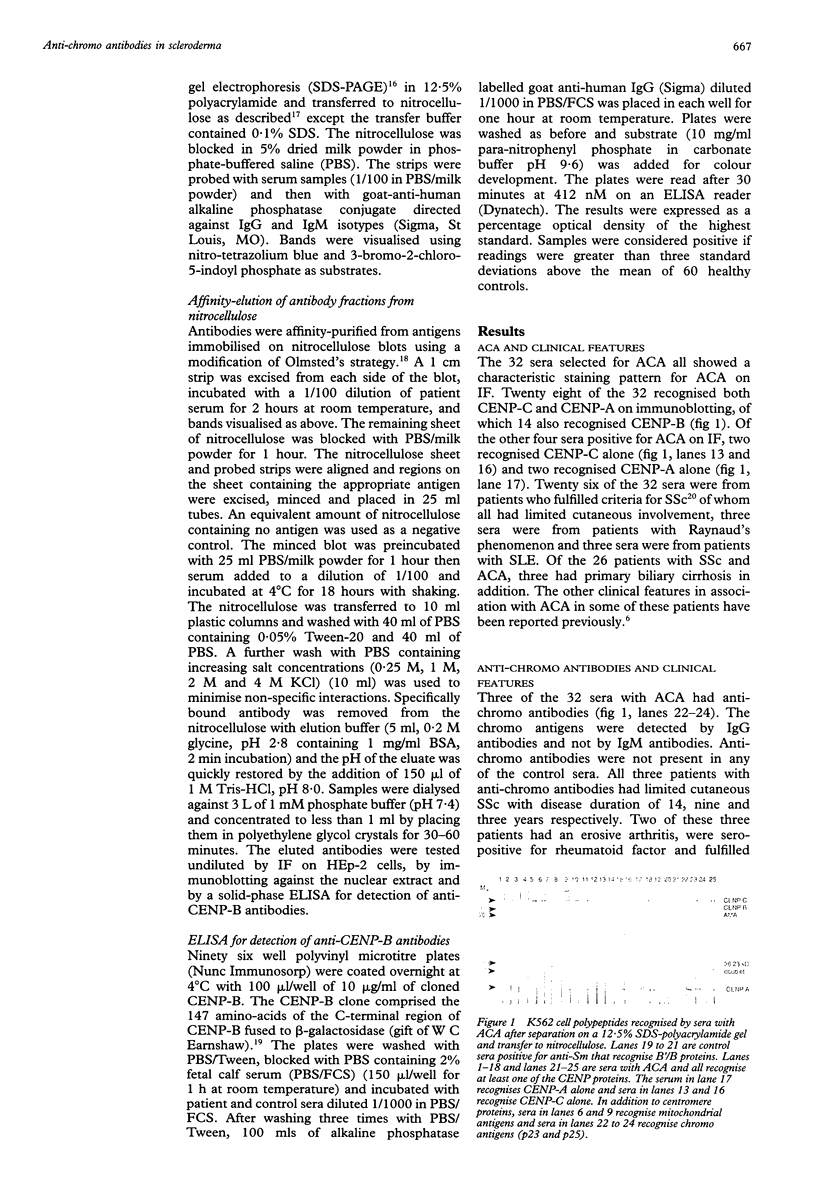
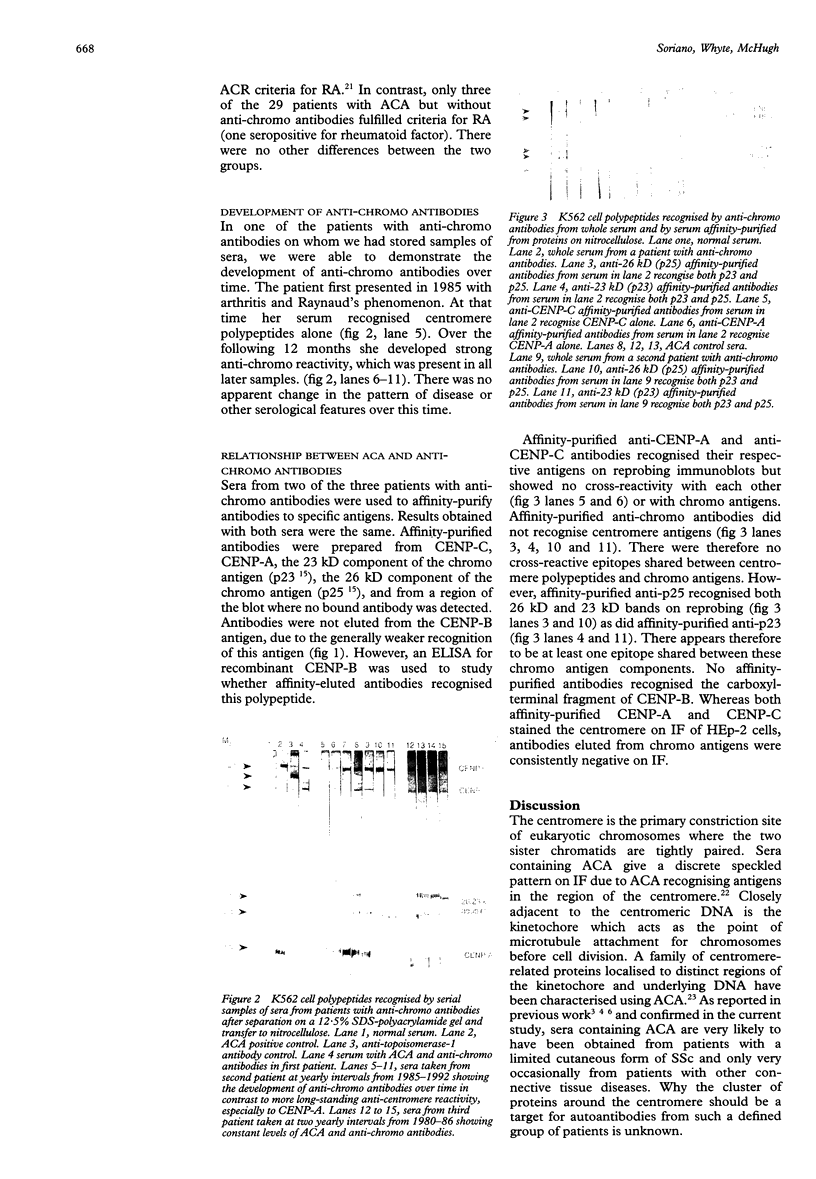
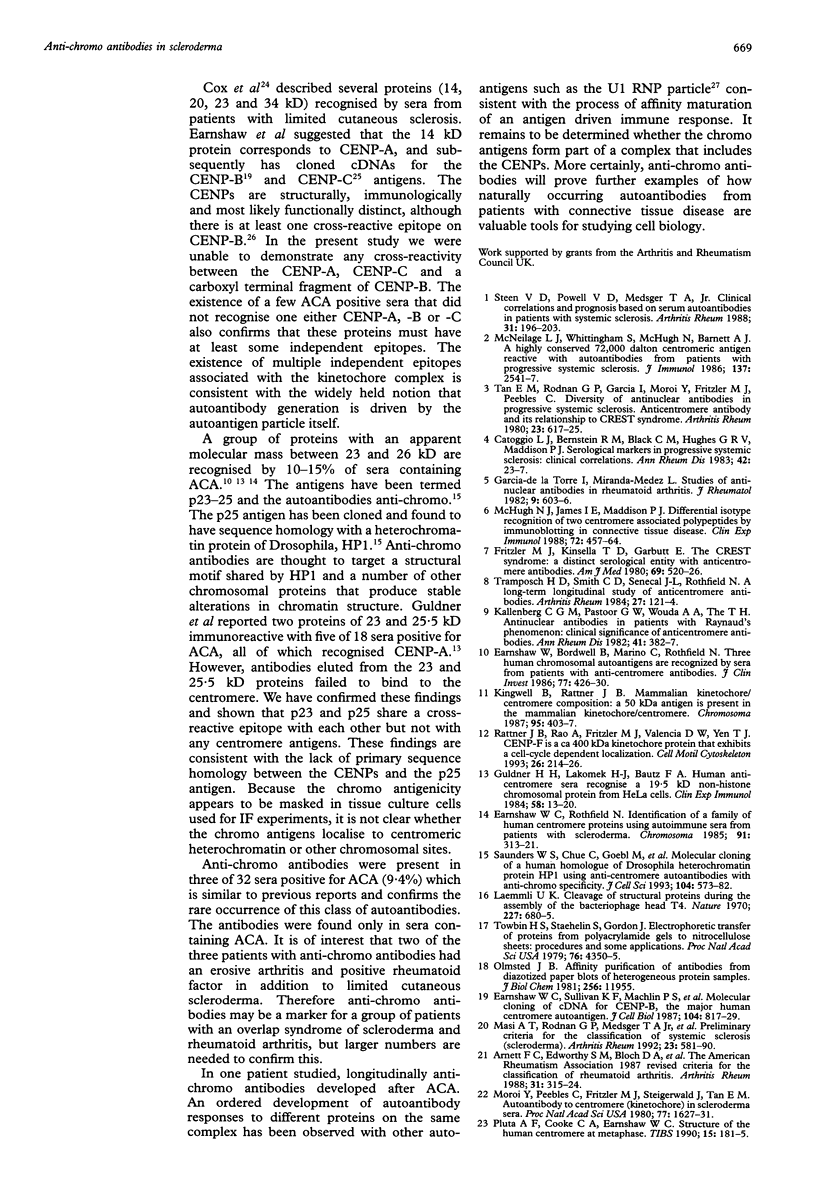
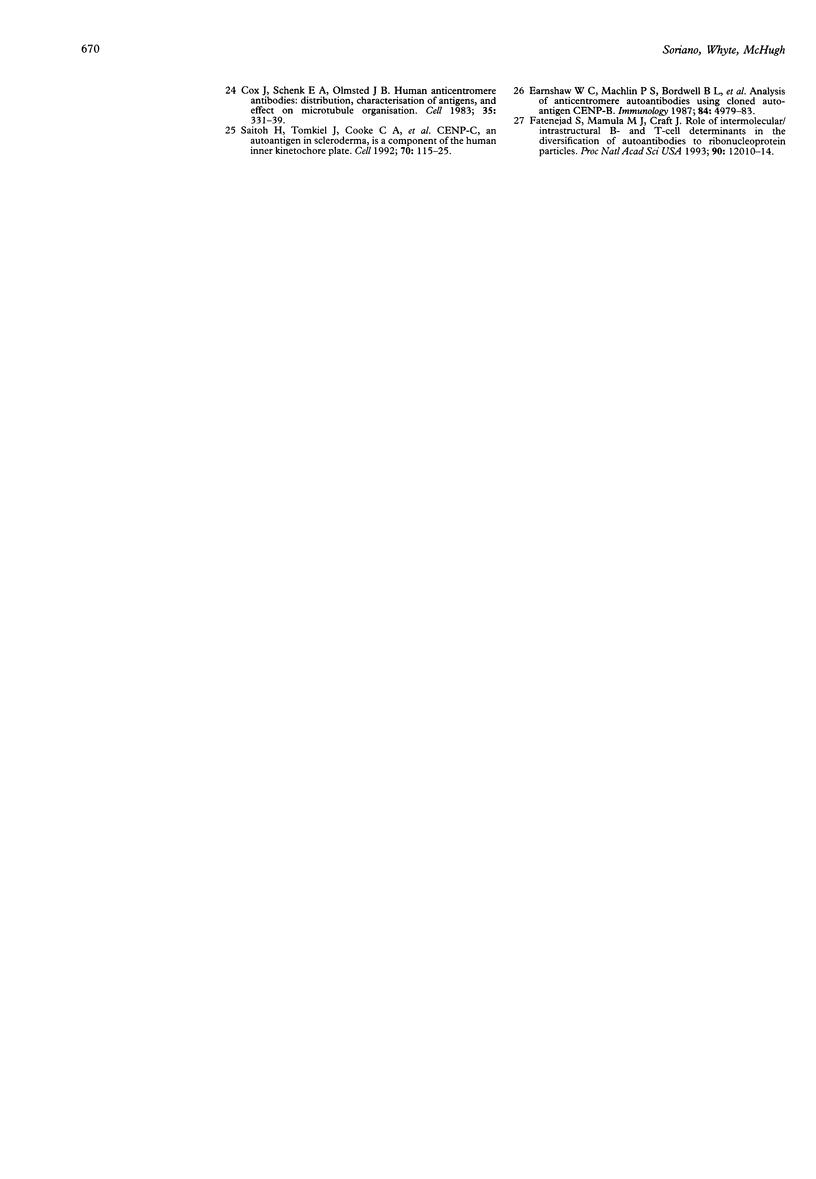
Images in this article
Selected References
These references are in PubMed. This may not be the complete list of references from this article.
- Arnett F. C., Edworthy S. M., Bloch D. A., McShane D. J., Fries J. F., Cooper N. S., Healey L. A., Kaplan S. R., Liang M. H., Luthra H. S. The American Rheumatism Association 1987 revised criteria for the classification of rheumatoid arthritis. Arthritis Rheum. 1988 Mar;31(3):315–324. doi: 10.1002/art.1780310302. [DOI] [PubMed] [Google Scholar]
- Catoggio L. J., Bernstein R. M., Black C. M., Hughes G. R., Maddison P. J. Serological markers in progressive systemic sclerosis: clinical correlations. Ann Rheum Dis. 1983 Feb;42(1):23–27. doi: 10.1136/ard.42.1.23. [DOI] [PMC free article] [PubMed] [Google Scholar]
- Earnshaw W. C., Rothfield N. Identification of a family of human centromere proteins using autoimmune sera from patients with scleroderma. Chromosoma. 1985;91(3-4):313–321. doi: 10.1007/BF00328227. [DOI] [PubMed] [Google Scholar]
- Earnshaw W. C., Sullivan K. F., Machlin P. S., Cooke C. A., Kaiser D. A., Pollard T. D., Rothfield N. F., Cleveland D. W. Molecular cloning of cDNA for CENP-B, the major human centromere autoantigen. J Cell Biol. 1987 Apr;104(4):817–829. doi: 10.1083/jcb.104.4.817. [DOI] [PMC free article] [PubMed] [Google Scholar]
- Earnshaw W., Bordwell B., Marino C., Rothfield N. Three human chromosomal autoantigens are recognized by sera from patients with anti-centromere antibodies. J Clin Invest. 1986 Feb;77(2):426–430. doi: 10.1172/JCI112320. [DOI] [PMC free article] [PubMed] [Google Scholar]
- Fatenejad S., Mamula M. J., Craft J. Role of intermolecular/intrastructural B- and T-cell determinants in the diversification of autoantibodies to ribonucleoprotein particles. Proc Natl Acad Sci U S A. 1993 Dec 15;90(24):12010–12014. doi: 10.1073/pnas.90.24.12010. [DOI] [PMC free article] [PubMed] [Google Scholar]
- Fritzler M. J., Kinsella T. D. The CREST syndrome: a distinct serologic entity with anticentromere antibodies. Am J Med. 1980 Oct;69(4):520–526. doi: 10.1016/0002-9343(80)90462-3. [DOI] [PubMed] [Google Scholar]
- Garcia-de la Torre I., Miranda-Mendez L. Studies of antinuclear antibodies in rheumatoid arthritis. J Rheumatol. 1982 Jul-Aug;9(4):603–606. [PubMed] [Google Scholar]
- Guldner H. H., Lakomek H. J., Bautz F. A. Human anti-centromere sera recognise a 19.5 kD non-histone chromosomal protein from HeLa cells. Clin Exp Immunol. 1984 Oct;58(1):13–20. [PMC free article] [PubMed] [Google Scholar]
- Kallenberg C. G., Pastoor G. W., Wouda A. A., The T. H. Antinuclear antibodies in patients with Raynaud's phenomenon: clinical significance of anticentromere antibodies. Ann Rheum Dis. 1982 Aug;41(4):382–387. doi: 10.1136/ard.41.4.382. [DOI] [PMC free article] [PubMed] [Google Scholar]
- Kingwell B., Rattner J. B. Mammalian kinetochore/centromere composition: a 50 kDa antigen is present in the mammalian kinetochore/centromere. Chromosoma. 1987;95(6):403–407. doi: 10.1007/BF00333991. [DOI] [PubMed] [Google Scholar]
- Laemmli U. K. Cleavage of structural proteins during the assembly of the head of bacteriophage T4. Nature. 1970 Aug 15;227(5259):680–685. doi: 10.1038/227680a0. [DOI] [PubMed] [Google Scholar]
- McHugh N. J., James I. E., Maddison P. J. Differential isotype recognition of two centromere associated polypeptides by immunoblotting in connective tissue disease. Clin Exp Immunol. 1988 Jun;72(3):457–464. [PMC free article] [PubMed] [Google Scholar]
- McNeilage L. J., Whittingham S., McHugh N., Barnett A. J. A highly conserved 72,000 dalton centromeric antigen reactive with autoantibodies from patients with progressive systemic sclerosis. J Immunol. 1986 Oct 15;137(8):2541–2547. [PubMed] [Google Scholar]
- Moroi Y., Peebles C., Fritzler M. J., Steigerwald J., Tan E. M. Autoantibody to centromere (kinetochore) in scleroderma sera. Proc Natl Acad Sci U S A. 1980 Mar;77(3):1627–1631. doi: 10.1073/pnas.77.3.1627. [DOI] [PMC free article] [PubMed] [Google Scholar]
- Olmsted J. B. Affinity purification of antibodies from diazotized paper blots of heterogeneous protein samples. J Biol Chem. 1981 Dec 10;256(23):11955–11957. [PubMed] [Google Scholar]
- Pluta A. F., Cooke C. A., Earnshaw W. C. Structure of the human centromere at metaphase. Trends Biochem Sci. 1990 May;15(5):181–185. doi: 10.1016/0968-0004(90)90158-8. [DOI] [PubMed] [Google Scholar]
- Rattner J. B., Rao A., Fritzler M. J., Valencia D. W., Yen T. J. CENP-F is a .ca 400 kDa kinetochore protein that exhibits a cell-cycle dependent localization. Cell Motil Cytoskeleton. 1993;26(3):214–226. doi: 10.1002/cm.970260305. [DOI] [PubMed] [Google Scholar]
- Reichenspurner H., Hildebrandt A., Human P. A., Boehm D. H., Rose A. G., Odell J. A., Reichart B., Schorlemmer H. U. 15-Deoxyspergualin for induction of graft nonreactivity after cardiac and renal allotransplantation in primates. Transplantation. 1990 Aug;50(2):181–185. doi: 10.1097/00007890-199008000-00001. [DOI] [PubMed] [Google Scholar]
- Saitoh H., Tomkiel J., Cooke C. A., Ratrie H., 3rd, Maurer M., Rothfield N. F., Earnshaw W. C. CENP-C, an autoantigen in scleroderma, is a component of the human inner kinetochore plate. Cell. 1992 Jul 10;70(1):115–125. doi: 10.1016/0092-8674(92)90538-n. [DOI] [PubMed] [Google Scholar]
- Saunders W. S., Chue C., Goebl M., Craig C., Clark R. F., Powers J. A., Eissenberg J. C., Elgin S. C., Rothfield N. F., Earnshaw W. C. Molecular cloning of a human homologue of Drosophila heterochromatin protein HP1 using anti-centromere autoantibodies with anti-chromo specificity. J Cell Sci. 1993 Feb;104(Pt 2):573–582. doi: 10.1242/jcs.104.2.573. [DOI] [PubMed] [Google Scholar]
- Steen V. D., Powell D. L., Medsger T. A., Jr Clinical correlations and prognosis based on serum autoantibodies in patients with systemic sclerosis. Arthritis Rheum. 1988 Feb;31(2):196–203. doi: 10.1002/art.1780310207. [DOI] [PubMed] [Google Scholar]
- Tan E. M., Rodnan G. P., Garcia I., Moroi Y., Fritzler M. J., Peebles C. Diversity of antinuclear antibodies in progressive systemic sclerosis. Anti-centromere antibody and its relationship to CREST syndrome. Arthritis Rheum. 1980 Jun;23(6):617–625. doi: 10.1002/art.1780230602. [DOI] [PubMed] [Google Scholar]
- Towbin H., Staehelin T., Gordon J. Electrophoretic transfer of proteins from polyacrylamide gels to nitrocellulose sheets: procedure and some applications. Proc Natl Acad Sci U S A. 1979 Sep;76(9):4350–4354. doi: 10.1073/pnas.76.9.4350. [DOI] [PMC free article] [PubMed] [Google Scholar]
- Tramposch H. D., Smith C. D., Senecal J. L., Rothfield N. A long-term longitudinal study of anticentromere antibodies. Arthritis Rheum. 1984 Feb;27(2):121–124. doi: 10.1002/art.1780270201. [DOI] [PubMed] [Google Scholar]





